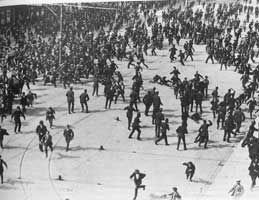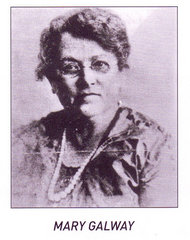Related Research Articles

Linen is a textile made from the fibers of the flax plant.

The Transport and General Workers' Union was one of the largest general trade unions in the United Kingdom and Ireland – where it was known as the Amalgamated Transport and General Workers' Union (ATGWU) to differentiate itself from the Irish Transport and General Workers' Union – with 900,000 members. It was founded in 1922 and Ernest Bevin served as its first general secretary.

James Larkin, sometimes known as Jim Larkin or Big Jim, was an Irish republican, socialist and trade union leader. He was one of the founders of the Irish Labour Party along with James Connolly and William O'Brien, and later the founder of the Irish Worker League, as well as the Irish Transport and General Workers' Union (ITGWU) and the Workers' Union of Ireland. Along with Connolly and Jack White, he was also a founder of the Irish Citizen Army. Larkin was a leading figure in the Syndicalist movement.
The Ulster Unionist Labour Association was an association of trade unionists founded by Edward Carson in June 1918, aligned with the Ulster Unionists in Ireland. Members were known as Labour Unionists. In Britain, 1918 and 1919 were marked by intense class conflict. This phenomenon spread to Ireland, the whole of which was under British rule at the time. This period also saw a large increase in trade union membership and a series of strikes. These union activities raised fears in a section of the Ulster Unionist leadership, principally Edward Carson and R. Dawson Bates. Carson at this time was president of the British Empire Union, and had been predisposed to amplify the danger of a Bolshevik outbreak in Britain.

Irish linen is the brand name given to linen produced in Ireland. Linen is cloth woven from, or yarn spun from flax fibre, which was grown in Ireland for many years before advanced agricultural methods and more suitable climate led to the concentration of quality flax cultivation in northern Europe. Most of the world crop of quality flax is now grown in northern France, Belgium and the Netherlands. Since about the 1950s to 1960s, the flax fibre for Irish linen yarn has been imported almost exclusively from France, Belgium, and the Netherlands. It is bought by spinners who produce yarn, which is then sold to weavers who produce fabric. Irish linen spinning has now virtually ceased, yarns being imported from places such as the eastern part of the European Union and China.

The Dublin lock-out was a major industrial dispute between approximately 20,000 workers and 300 employers which took place in Ireland's capital city of Dublin. The dispute lasted from 26 August 1913 to 18 January 1914, and is often viewed as the most severe and significant industrial dispute in Irish history. Central to the dispute was the workers' right to unionise.
The Power Loom Tenters' Trade Union of Ireland was a trade union representing workers involved in stretching linen being manufactured in the Belfast area of Ireland.

The Irish Trades Union Congress (ITUC) was a union federation covering the island of Ireland.

The Belfast Dock strike or Belfast lockout took place in Belfast, Ireland from 26 April to 28 August 1907. The strike was called by Liverpool-born trade union leader James Larkin who had successfully organised the dock workers to join the National Union of Dock Labourers (NUDL). The dockers, both Protestant and Catholic, had gone on strike after their demand for union recognition was refused. They were soon joined by carters, shipyard workers, sailors, firemen, boilermakers, coal heavers, transport workers, and women from the city's largest tobacco factory. Most of the dock labourers were employed by powerful tobacco magnate Thomas Gallaher, chairman of the Belfast Steamship Company and owner of Gallaher's Tobacco Factory.

Alexander Bowman was an Irish politician and trade unionist.

The Irish Congress of Trade Unions, formed in 1959 by the merger of the Irish Trades Union Congress and the Congress of Irish Unions, is a national trade union centre, the umbrella organisation to which trade unions in both the Republic of Ireland and Northern Ireland affiliate.

Thy Industrial Revolution in Scotland was the transition to new manufacturing processes and economic expansion between the mid-eighteenth century and the late nineteenth century. By the start of the eighteenth century, a political union between Scotland and England became politically and economically attractive, promising to open up the much larger markets of England, as well as those of the growing British Empire, resulting in the Treaty of Union of 1707. There was a conscious attempt among the gentry and nobility to improve agriculture in Scotland. New crops were introduced and enclosures began to displace the run rig system and free pasture. The economic benefits of union were very slow to appear, some progress was visible, such as the sales of linen and cattle to England, the cash flows from military service, and the tobacco trade that was dominated by Glasgow after 1740. Merchants who profited from the American trade began investing in leather, textiles, iron, coal, sugar, rope, sailcloth, glass-works, breweries, and soap-works, setting the foundations for the city's emergence as a leading industrial center after 1815.
Belfast Trades Council, also known as Belfast & District Trades Union Council, brings together trade unionists in and around Belfast in Northern Ireland.
Andrew Mulholland, was a northern Irish cotton and linen manufacturer.

Robert Gageby was an Irish trade union leader and politician.
The Flax Roughers' and Yarn Spinners' Trade Union was a trade union representing lower-paid workers in the flax industry in the north of Ireland.

The National Federation of Women Workers (NFWW) was a trade union in the United Kingdom of Great Britain and Ireland active in the first part of the 20th century. Instrumental in winning women workers the right to a minimum wage for the first time, the NFWW broke down barriers for women's membership in trade unions in general.
Joseph Harris was an Irish trade unionist and political activist.

Mary Galway , was an Irish trade unionist and suffragist. She was President of the Textile Operatives Society and she and another woman were exceptionally sent to national conference fifteen years before another woman was chosen.
Ellen "Nellie" Grimley also known as Nellie Gordon was an Irish trade unionist.